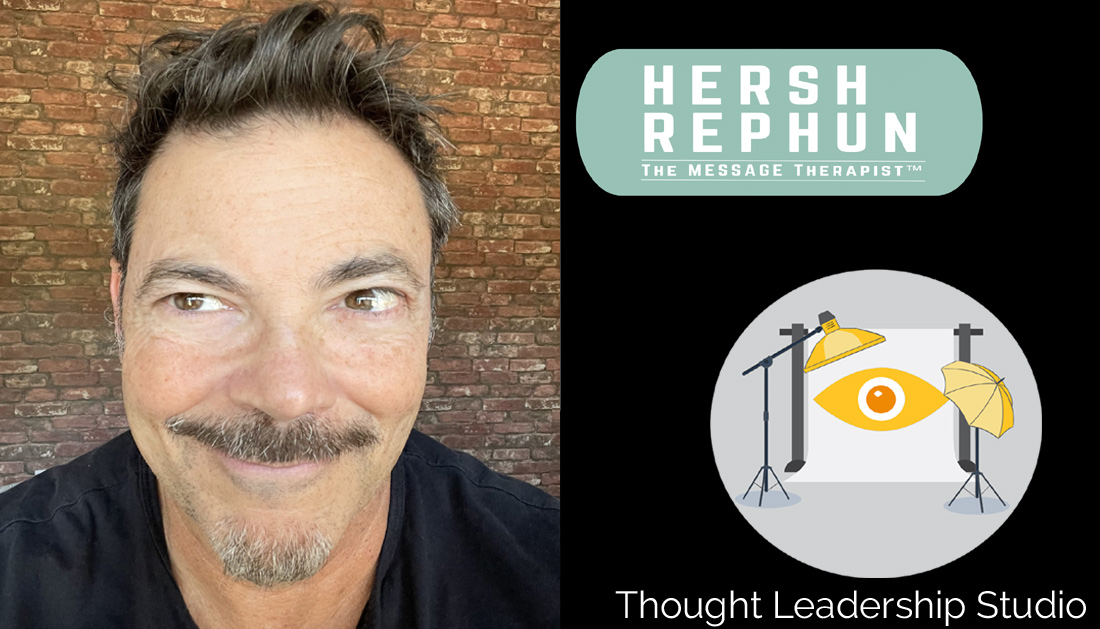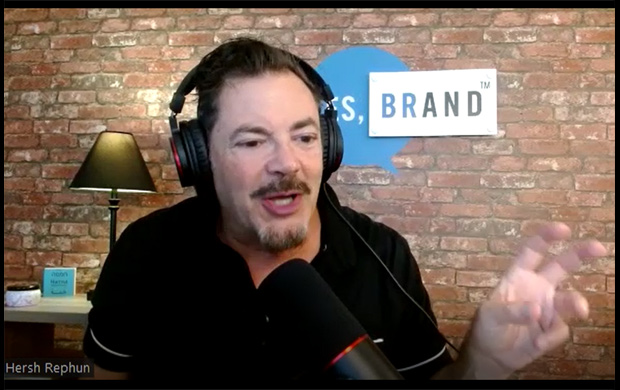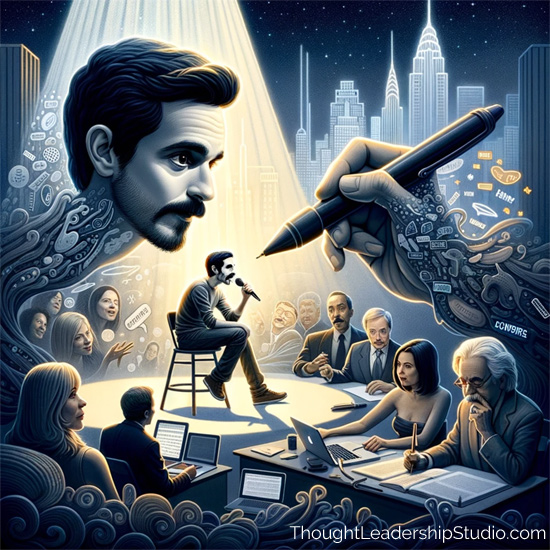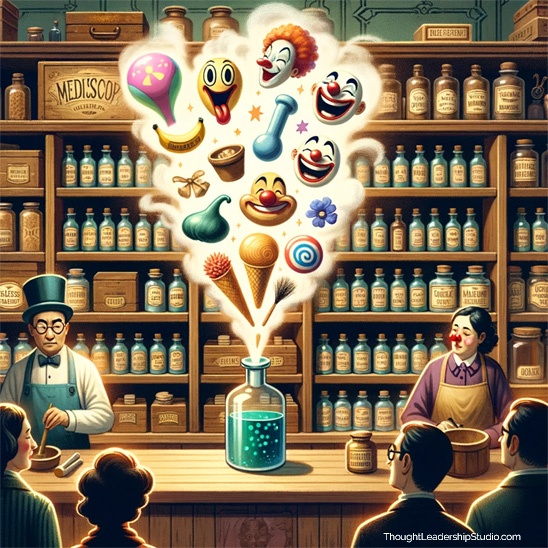Thought Leadership Studio Podcast Episodes:
From Standup Comedy to Brand Therapy with Hersh Rephun
Episode 57 - Dive into the importance of humor, empathy, and authenticity in building a strong brand voice.

#branding, #communication, #humor, #inspiration, #interviews, #marketing, #marketingstrategy, #storytelling, #thoughtleadership, #thoughtleadershipexamples
Or Click here to listen or subscribe on appWhat this episode will do for you
:- Discover the Confluence of Comedy and Branding: Dive into Hersh Rephun's journey from standup comedy to crafting brand voices, and understand how humor is a vital component in effective branding.
- Enhance Your Brand's Voice: Learn from Rephun's unique experience in both comedy and branding to refine and express your brand's authentic voice.
- Understand Strategic Thought Leadership: Explore the parallels between humor, comedy, and strategic thought leadership, and how shifting frames of reference can be a powerful tool in messaging.
- Unlock the Power of Humor: Grasp how humor serves as a salve, diffusing tension, equalizing situations, and making messages more relatable and impactful.
- Humanize Your Brand: Realize the importance of adding a human touch, empathy, and authenticity to your brand, making it more accessible and resonant with your audience.
- Embrace Truth in Messaging: Delve into the concept of "Selling the Truth" and how humor can be a medium to communicate harsh realities or truths in a palatable manner.
Hersh Rephun - Brand Therapist.
In this episode, we're excited to introduce Hersh Rephun.
Hersh, a consultant and coach who specializes in brand voice, discusses his unique journey that led him to his current work. He explains how his background in stand-up comedy and advertising helped him develop his skills in brand messaging and communication.
Hersh emphasizes the importance of humor, empathy, and authenticity in building a strong brand voice. He also discusses his upcoming book, "Selling the Truth," and offers advice for individuals looking to evolve their brand voice. Hersh encourages individuals to take time to reflect on their brand, write down their thoughts, and identify any gaps or areas for improvement.
Some of Hersh's coordinates:
Curated Transcript of Interview with Hersh Rephun
The following partial transcript is lightly edited for clarity - the full interview is on audio. Click here to listen.
Chris McNeil: I'm Chris McNeil, with Thought Leadership Studio, and I'm sitting here with Hersh Rephun, who is a consultant ,coach, and offers workshops online about brand voice. Welcome, Hersh. Great to have you here.
 Hersh Rephun: It's great to be here, Chris. Thank you.
Hersh Rephun: It's great to be here, Chris. Thank you.
Chris McNeil: Well, to introduce our listeners to you, what's a story you could tell about what puts you on the track of doing this kind of work where you help founders, CEOs, consultants, thought leaders, influencers to define and refine and deploy their unique brand voice?
From Standup Comedy to Brand Therapy
Hersh Rephun: Well, it was kind of a unique coming together of standup comedy, which was a first love of mine. When I was younger and living in New York and I was working, I went to school of visual arts, so I studied advertising and I got a job on Madison Avenue, but at night I would go and do standup, and it was, at first, I kept them very separate because my job wasn't as a copywriter at first, I was representing directors of TV commercials and composers and editors.
 So I was on the agent side, not on the copywriting side. And I would get, my boss would say, you're really creative. Could you want to sit in on this meeting, throw in some ideas? Directors would ask me for ideas. Sometimes my boss would send me over to an agency to do some copywriting for them as a freelancer.
So I was on the agent side, not on the copywriting side. And I would get, my boss would say, you're really creative. Could you want to sit in on this meeting, throw in some ideas? Directors would ask me for ideas. Sometimes my boss would send me over to an agency to do some copywriting for them as a freelancer.
And so I had a kind of unique workflow going there, and the standup comedy was just something I would do. And I didn't even in fact have a ton of time to do it. But for a while there I was getting my chops as a standup comedian, but I was always funny. It was always, humor was always a nice anchor for what I did. And that evolved into directors saying, Hey, Hersh, would you write my bio or would you write a press release? There were no publicists per se, in the production and post-production world of advertising.
And so I just did that and I would send the blurb out, I would write up do the little writeup, and they were like, Hey, this is really great. You should start a little cottage industry, which is what I did. And I had a couple of firms that specialized in PR for that market.
But at the same time, there was a point at which I realized the comedy, and whether it's PR or it's advertising, it's all communicating. It's all messaging. So in my journey over the last couple of decades I did, I was head of communications or I was pr, or I was a freelance creative director, or I was a standup comic. Either way, I was communicating ideas about identity. When I was doing standup, I was doing voices and characters and stuff like that. When I was doing it on the business side, I was listening to clients' voice and attitude and tone. And so I picked up on that stuff very easily.
So if a client had a certain way of communicating about their brand, especially a founder or ACEO, I could turn that channel that into a message that really sounded like them, but maybe a little more effective in terms of getting attention. And that's how this message therapist kind of reputation came up because at the CEO level, at the founder level, they would say, Hey, can I confide in you? Can I tell you what's really happening with this brand? And can you help us through this thing? And that's where the consulting started.
Chris McNeil: I can see so many parallels with humor and comedy, and what we talk about here, which is strategic thought leadership. Aren't both about a paradigm shift? I mean, isn't a joke about shifting the frame of reference? And the thinking on your feet aspect ...
Hersh Rephun: For sure.
Chris McNeil: And the aspect of getting a response, packaging your message to get a response, being in tune with your audience. And I'm sure there's lots more threads to follow ... So it was kind of a throw these things into an omelet pan and make an omelet out of ingredients nobody else yet expected? And it turned out really well.
Hersh Rephun: Yeah, very well said. I mean, it's humor. If we think about the ingredients that make up comedy, there's pain, there's disappointment, there's reversal, there's reorientation, all these things that happen in humorous stories. And so that's why I came to say that my job was really to help people sell the truth with humor and humanity, because that empathetic element, that part that feels for other people is a large part of humor.

Humor Helps the Medicine Go Down
Because humor is a salve in a way. It helps the medicine go down. It's an equalizer, it diffuses tension, it releases tension. So all those things are things that I think are needed for people to relate to a brand and start to, whether you have a personal brand or you have a small business or a billion dollar brand, it doesn't matter. That spark, that individual spark is what really drives the connection with the audience.
Chris McNeil: That humanizes it, doesn't it?
Hersh Rephun: Yeah, it humanizes. Exactly.
Chris McNeil: And we talked a little bit before we started recording about a book you're working on called Selling the Truth. And I love the concept, and my understanding is going way back, it wasn't at the court gestures in times where you'd kill the messenger.
They're the ones in court who had unique license to tell the truth. And I think comedians like George Carlin, who would be a big truth teller and package it in a way, so in its humorous, but could tell the truth in a way that mainstream media really could not.
Hersh Rephun: Yeah, yeah. I think that, and it's funny because as a comedian, that wasn't my role initially in my own mind. I think that for a lot of my early years, I used the voices and storytelling and all that stuff just to kind of be a salve and coat and be funny. And I was one of the lighter kind of comic. But in about 2011, I started doing it again, and I very quickly made a move to more substantive and dark, serious issues, drugs, alcohol, suicide, things like that were not off limits, not as a shock, as a shock comedian, but as someone who just was willing to talk about stuff.
Making it Human and Framing Reality
But the humor made it work. And if it was funny and if it had some pathos, some kind of sentiment about it, it worked. But you're right, it's the comedians who can be pointed. It's the comedians who can, and it's not to say, I'm just kidding to say, well, I'm kidding because that's the only way we can deal with this. That's what it is. I'm not kidding. I'm just kind of coding.
 Chris McNeil: Right. So when you bring this to the table, when you're working with someone who wants to expand their influence or their personal brand or as a spokesman for the brand, their company, you're helping them, and correct me if I'm wrong, but you're helping them bring emotion to it. And this background as a comedian, knowing how to use comedy as a salve, how to deal with hard issues, I imagine could make it so that hey, when you have to deliver a difficult message, there's a way to do it that people relate to you as a human and be more accepting. Perhaps when you have to deliver a message of leadership and authority, there's also a way to deliver that so you don't seem disconnected, but you seem like a human and someone something can relate to. Do you find that to be the case?
Chris McNeil: Right. So when you bring this to the table, when you're working with someone who wants to expand their influence or their personal brand or as a spokesman for the brand, their company, you're helping them, and correct me if I'm wrong, but you're helping them bring emotion to it. And this background as a comedian, knowing how to use comedy as a salve, how to deal with hard issues, I imagine could make it so that hey, when you have to deliver a difficult message, there's a way to do it that people relate to you as a human and be more accepting. Perhaps when you have to deliver a message of leadership and authority, there's also a way to deliver that so you don't seem disconnected, but you seem like a human and someone something can relate to. Do you find that to be the case?
Hersh Rephun: Yeah, Chris, I really do because one of the ways you find out what you're good at is when you witness things and feel like, ah, they should have blank, or Ah, why didn't they just do blank? And I'm sure you've experienced that, and it can be very frustrating. And that's one of the reasons why I decided at a certain point not to sit on the sidelines and just feel bad that people missed an opportunity or fumbled a transition. I really believe that the selling the truth thing is not only about honesty is the best policy, how do we navigate it? It's not really, it's not a moral judgment.
It's that the better we are at framing reality, the better we will do. And that's simply because of that trust element, that bond that has to be established with your audience, with your customer. And so given that reality, then I think that where I try to guide people is if you can get in touch with your reality and you start with little stuff, if you can build your reality out from the inside out, no one can counter your personal truth. Nobody can counter what you believe. Nobody can counter what your commitment to your brand and your product and your customer is. Those things are yours to build. And if you build those from the inside out, you're going to find that you're building a trustworthy brand.
Chris McNeil: That makes perfect sense. I guess there's a certain vulnerability involved with someone who might be the top tier of a large organization opening up so that they can feel human when they might feel, "I need to be Ironman", you know.
Hersh Rephun: Right? Well, I need to protect myself. Or they feel they need to protect their brand or their workforce. And what they don't realize is that the team that is serving them wants to be included. And that's why I advocate for large company, not even large companies, but companies that are fortunate enough to have a workforce that they build this brand internally first with that workforce.
They communicate with them, they ask them their opinion, they include them because a lot of times what you'll see is a big brand will have a very good public image, but inside those insides are kind of rusty and not functioning so well. And that's because these people are feeling well, I get that it's all shiny on the outside, but on the what about us? What about the inside? Where are they walking the walk? Where are they living? That persona ...
Chris McNeil: That comes out these days, how the brand is portrayed to the public is often through the experience of the customer. So if you're not walking your talk in the world, they'll find out about it anyways.
So how do you create this environment where the people within an organization or the leaders are able to open up to you enough for you to help them evolve this?
Message Therapy Opens Up the Willingness to Share
Hersh Rephun: I think a lot of that comes from the combination of the humor and the human experience. It's like you mentioned, if you let people know, if you let those people at the top, and by the way, they don't have to share everything, not, it's not about sharing or oversharing, it's about access and saying, okay, what is your reason for being, for doing this? What is your most treasured goal? And then saying to a person who works for you, who may not even have a very high role in the hierarchy and saying to them, Hey, what is your most cherished goal? What is it it for you?
And then bringing those two things together can be transformative. And nobody lost anything. If anything, both people gained. And so I think that kind of openness is so human and not really, it's not like I'm opening the books to everybody. I did this when I was 12. It's not about pouring your heart out, tapping into that one golden nugget of truth about yourself. And that's again, goes back to this message therapy thing because, I'm not a life coach, but I have a lot of us accumulated experience and knowledge and attitudes and opinions. And I think I just am willing to share that. And that willingness makes me accessible and it makes it easier in a one-on-one setting and in a group setting to share and be a little more open and a little more vulnerable to use that word that you used.
Chris McNeil: So in doing this, have you come across any interesting stories that you'd be willing to share, at least part of with our audience, it might illustrate the principle and a real life story that brings it to life and brings it to ground a little bit.
Hersh Rephun: And I won't mention the people that I was working with, but there was a brand that I was working with where they were very divorced from their image. In other words, it wasn't that they didn't live their image in the sense that it came from a very honest place, but they were struggling very hard to maintain a tight ship, to run a tight ship.
And they couldn't understand why was our brand not being perceived as this kind of warm, fuzzy brand. And I said, well, you guys, you're holding everything in. You're holding everything together. And I think perhaps in their case, they were growing at a pretty good rate.
 They were a family business, a family owned business, a privately owned business, but they just weren't letting anybody into any of that. And as soon as they let the audience in, it took on this life. And it's something they did through videos and they did it through, but it was very personal. It was that kind of sit down like I described to you where you sit down and you have this kind of round robin that starts in a very, just with the founders, with the management team and the C-Suite, we're talking about it like a year of working with this company and getting to know this company.
They were a family business, a family owned business, a privately owned business, but they just weren't letting anybody into any of that. And as soon as they let the audience in, it took on this life. And it's something they did through videos and they did it through, but it was very personal. It was that kind of sit down like I described to you where you sit down and you have this kind of round robin that starts in a very, just with the founders, with the management team and the C-Suite, we're talking about it like a year of working with this company and getting to know this company.
And everybody doesn't have to go that deep, but the transformation is in the perception that the buyer has, the purchaser has in the perception that the family has. That is the counterpoint to the founders. And it just was wonderful to see. And I think that anybody can do that. Anybody who's willing to take that first step of not just looking at data, data's really important, but it is a tool. AI is a tool. All these things are tools that are there to work for us. We're the humans, we're what this is here to serve. We created all these things.
We created created channels, we created distribution, we created marketplaces.
Chris McNeil: And how much of this, the need for what you do you think has been driven by the change in how companies in marketplaces relate to one another? And I'm old enough, and I'm sure some of our listeners are as well, to remember the pre-internet days when the company bought the brand with interruption advertising on TV and newspapers, and they could portray anything they want in the hope that some people would read it and some people would buy into it and feel in control of the conversation, at least in an illusory kind of way.
New Paradigms of Marketing: Transparency & Social Responsibility
And now it's all super transparent. We have executives from that era waking up to the fact that they need to relate to their audience directly, perhaps to Twitter - now X - or LinkedIn and places like that, and their own voice be heard and allow the voice of everybody in the company to be heard directly and the customers to have access to that. And some seem to be in shock at this whole new world, and you still have outdated paradigms from the old way.
Hersh Rephun: Yeah. Well, and you also have social media being such a mixed bag. There is a lot of good, like I just mentioned with the tool reference, there can be a lot of good, but there can be a lot of bad. But I think this social responsibility aspect is only going to become emphasized more and more. It's going to happen with hot button issues. It's going to happen with climate change questions.
It's going to happen with social responsibility from a point of view of speaking to teens and speaking of vulnerable audiences, the AI appropriation of identity and all of those things that people are there fighting for right now on the picket lines with sag. And these things are not going away. They're only going to get more pronounced. And so my selling the truth point of view is, again, circles around to that, watching people make mistakes that they don't need to make and no company needs to be harmful.
Specifically, there are companies that are just, when they started 200 years ago, they didn't know that what they were doing was harmful. And now it's determining that it is. And they're even pivoting in a lot of cases, but they're not pivoting willingly. They're pivoting out of necessity. So they're pivoting slowly. And that's my little corner of the universe is simply to be a voice of support to say there's no reason to BS anybody. It is not going to end well for you. And by for you, I mean, whatever you're trying to build, if it's a smash and grab situation and you're trying to get in and out and you're just trying to make yours and then run off and get in a helicopter and fly away, then fine, then fine for me.
You're not going to be my client. You're not going to hire me. No, I've been approached, I have been approached in my career, I've been around a while, I've been approached in my career where people had the idea of BS-ing somebody and how do they do that? How do we make it look like? And it never ignited. And again, it's not morality, it's just common sense. Never ignited my passion and I couldn't do it.
It just didn't sit right. I don't know why, but it just felt to me like so much effort as an actor when I was young and I was in plays and I did some acting and I loved it because of that dividing line because you could wear the coutre of anybody no matter how foul, no matter how evil, and you could enjoy that vicariously and play that out and play the villain or play the fool or play these things.
But in real life, just that the beauty of doing a scene is that you're doing a scene with a partner in most cases, and therein on the fantasy and the audience is suspending their disbelief. What's happened these days, Chris, is that I think we've been too willing or out just out of pressure. We've been too willing to suspend our disbelief in real life.
And we're like, Hey, that's not how it works. It's going to come back. You're going to have to face reality at some point. And whether we call it reality or we don't call it reality, or we think it's fake or we don't believe it, it's going to happen. There'll be a point at which we come up against what is really a immovable in the world, and we'll meet that. And then what we'll be disillusioned, we'll be unhappy, and there's no reason to make things worse than they are. Make 'em better, make them better. But you got to face it before you can make it better.
Chris McNeil: That's right. Hey, we're agents of change and the better rapport we have with our audience .. and, you know, it's something I still run into in my world as both on the coaching, consulting and thought leadership, and on the marketing agency side are leaders who are fearful of online criticism and they hold back to this kind of opening up. They hold back on getting their name out there, their message out there.
And to some extent, at least initially because of the fear of criticism, there's going to be trolls. And do you run into that and how do you help your clients deal with that?
***************************************
The transcript is lightly edited for clarity and is a partial transcript- the full interview is on audio. Click here to listen.
***************************************
Free Stuff and Offers Mentioned in Podcast
***************************************
***************************************